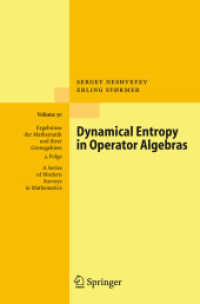- ホーム
- > 洋書
- > 英文書
- > History / World
Full Description
Lunar calendars suffer from an inherent uncertainty in the length of each month and the number of months in the year. Variable atmospheric conditions, weather and the acuity of the eye of an observer mean that the first sighting of the new moon crescent can never be known in advance. Calendars which rely on such observations to define the beginning of a new month therefore suffer from this lack of certainty as to whether a month will begin on a given day or the next. The papers in this volume address the question of how ancient and medieval societies lived with the uncertainties of a lunar calendar. How did lack of foreknowledge of the beginning of the month impact upon administration, the planning of festivals, and historical record keeping? Did societies replace the observation of the new moon crescent with schematic calendars or calendars based upon astronomical calculations and what were the ideological and practical consequences of such a change? The contributors to this volume address these topics from the perspectives of a variety of Ancient Near Eastern, Jewish, Ancient and Medieval European, Asian and American cultures.
Contents
Forward
Sunday in Mesopotamia (Wayne Horowitz)
Middle Assyrian Lunar Calendar and Chronology (Yigal Bloch)
Beyond the Moon: Minoan 'Calendar'-Symbolism in the 'Blue Bird Fresco' (Sabine Beckmann)
Early Greek Lunisolar Cycles: The Pythian and Olympic Games (Robert Hannah)
What To Do on the Thirtieth? A Neo-Platonic Interpretation of Hesiod's Works and Days 765-8 (Patrizia Marzillo)
Why Greek Lunar Months Began A Day Later than Egyptian Lunar Months, Both before First Visibility of the New Crescent (Leo Depuydt)
Lunar Calendars at Qumran? A Comparative and Ideological Study (Jonathan Ben-Dov)
From Observation to Calculation: The Development of the Rabbinic Lunar Calendar (Lawrence H. Schiffman)
The Rabbinic New Moon Procedure: Context and Significance (Sacha Stern)
Taming the Wild and Wilding the Tame: The Shifting Relationships between Humans, God and Nature in the Qumran and Rabbinic Calendars (Ron H. Feldman)
The Harmonization of the Lunar Year with the Julian Calendar by Anatolius, bishop of Laodicea (Daniel P. Mc Carthy)
Between Crucifixion and Calendar Reform: Medieval Christian Perceptions of the Jewish Lunisolar Calendar (Carl Phillip Emanuel Nothaft)
Christian Calendrical Fragments from Turfan (Mark Dickens and Nicholas Sims-Williams)
Lunar Tables in Medieval Russia (Michael L. Gorodetsky)
Telling Time with the Moon: An American Overview (Stanislaw Iwaniszewski)
Lunar Ceremonial Planning in the Ancient American Southwest (James Walton)
Adjusting Calculations to the Ideal in the Chinese and Japanese Calendars (Susan Tsumura)
Living with a Lunar Calendar in Mesopotamia and China (John Steele)







